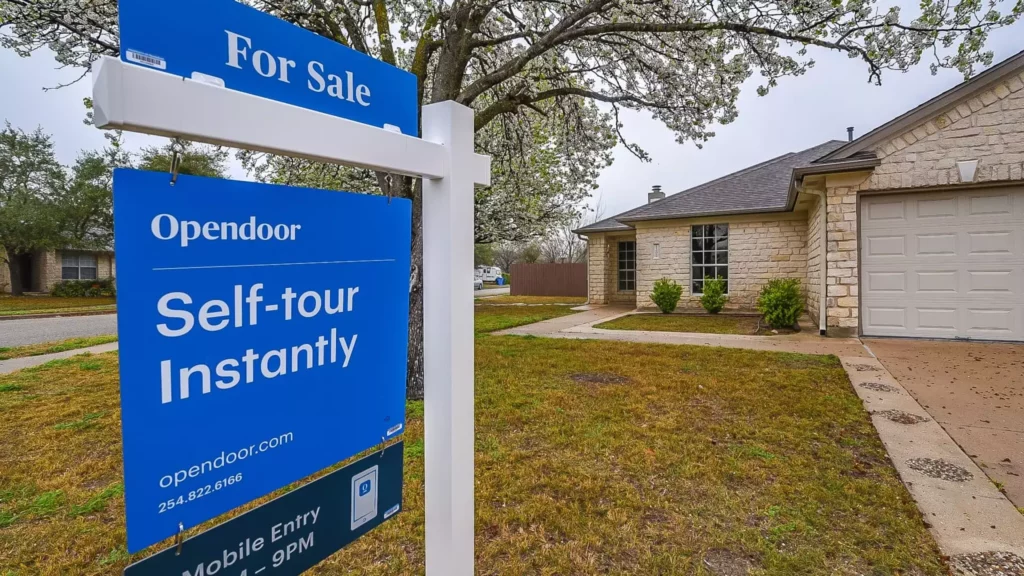The recent meteoric rise of Opendoor’s stock, soaring nearly fivefold since July, seems more like an emotional hype cycle than a reflection of genuine financial health. While some investors are captivated by the apparent optimism—fueled by hedge fund endorsements and a perception of strategic pivot—the underlying fundamentals remain shaky. The sudden rally cleverly disguises the company’s declining revenues, mounting losses, and market headwinds that threaten its very existence. A company that was nearly bankrupt just months ago cannot simply reinvent itself with a shiny new narrative of “less capital intensive” referrals without addressing core issues rooted in its business model and market realities.
The excitement around Opendoor’s stock might tempt some to believe a quick turnaround is imminent. Yet, the reality of real estate transactions, especially during times of rising interest rates and economic uncertainty, cannot be magic-marketed away. When mortgage rates climb, homebuying dries up, and companies that relied heavily on the boom of the Covid-era housing frenzy find themselves adrift in a deteriorating landscape. This isn’t a typical market correction but a fundamental realignment that exposes Opendoor’s overreliance on a now-defunct business model.
Illusory Optimism Amid Deeper Structural Flaws
The company’s recent attempt to pivot toward a referral-based, less capital-intensive model betrays an urgent recognition of its diminished feasibility in traditional iBuying. It’s a strategy that sounds promising on paper—less risk, less capital outlay, better margins—but it also signifies a retreat from the core promise that initially attracted investors: rapid, technology-driven home flipping and buying. This strategic recalibration, while necessary, appears more like damage control than a bold path forward. It signals a company grasping for relevance rather than one confidently set to redefine the industry.
Further complicating matters is the dissonance between investor hype and actual financial data. While hedge funds and certain market insiders, like Eric Jackson, voice bullish predictions—implying stock prices could someday hit $82—these projections are wildly aspirational. The firm’s current revenue figures tell a different story. Last quarter’s modest 4% growth to $1.57 billion doesn’t justify the euphoric trading frenzy. In fact, the forecasted revenue decline in the upcoming quarter underscores the company’s fragile footing. It is obvious that the market is pricing hope rather than reality, which is a dangerous gamble for investors.
The False Promise of a Quick Resurgence
A closer look at the recent numbers reveals a company struggling to maintain stability. Reduced homes acquired, cutting marketing spend, and a decreasing home inventory demonstrate a shrinking moat in an already competitive industry. The notion that Opendoor could quickly regain its mid-2022 revenue levels—let alone turn a profit—ignores the structural headwinds it faces. Persistent high mortgage rates, combined with declining seller demand, will continue to suppress unit sales and profitability.
Carrie Wheeler’s remarks about “listening to feedback” and “broadening” the company’s story amount to little more than window dressing. The core issue isn’t how much visibility Opendoor gains but whether it can adapt to an environment fundamentally hostile to its original business model. The company’s troubles are emblematic of a broader real estate market correction that no amount of strategic pivoting can fully evade. Investor enthusiasm, however spirited, dwarfs the tangible progress in the company’s financial health.
The Narrative of Innovation versus the Harsh Reality
The recent optimism surrounding Opendoor reflects a common pattern in modern markets—hype fueled by hope and policy shifts rather than solid financial improvements. While swift stock surges can be tempting, they often mask more profound vulnerabilities. For a business like Opendoor, which depends heavily on a booming housing market and low interest rates, the current environment exposes its fragility.
The company’s pivot toward a more referral-based model is a commendable strategic shift but, in practice, is unlikely to be enough to sustain long-term viability without substantive market rebound or internal restructuring that addresses its core issues. Investors must question whether the current rally is a genuine sign of resilience or just a fleeting illusion that will crumble when market conditions turn against them once again. Opendoor’s story, so far, suggests that amidst the rhetoric of innovation, market realities remain unforgiving.









Leave a Reply